Sport

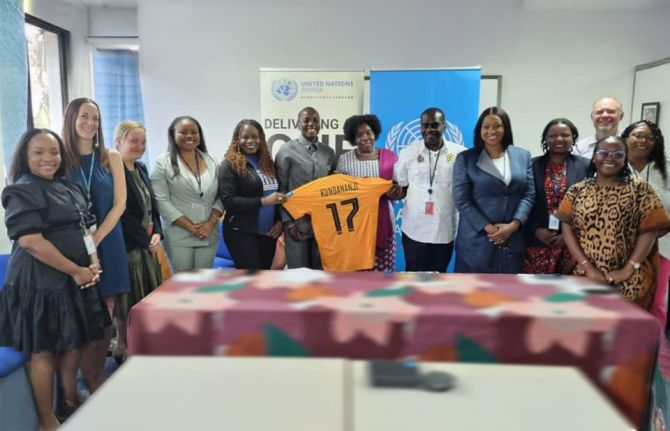
Press Release
Zambian football star Racheal Kundananji named UNAIDS Goodwill Ambassador for Education Plus in Zambia
23 January 2025 23 January 2025GENEVA/LUSAKA, 30 January 2025—Zambian football star Racheal Kundananji has been appointed as a UNAIDS Goodwill Ambassador to champion the fight to end AIDS as a public health threat in Zambia.
In her new role, Ms Kundananji will work with UNAIDS to champion HIV prevention, advocate for girls’ education to help reduce new HIV infections and sexually transmitted infections. She will also highlight the importance of preventing teenage pregnancy and advocate for an increase in HIV testing and access to health services for young people.
“I am so happy to be collaborating with UNAIDS to end AIDS as a public health threat in my country Zambia,” said Ms Kundananji. “Achieving this will require a collective effort, including ensuring that all young people in Zambia, particularly girls, remain in secondary education to reduce their risk of HIV infection and provide them with better economic opportunities.”
Ms Kundananji is already using her platform to drive change. She founded the Racheal Kundananji Legacy Foundation to harness the power of sport to address gender-based violence, sexual and reproductive health, and child marriage, demonstrating her deep commitment to empowering women and girls and tackling gender inequality.
“Ms Kundananji shares UNAIDS’ vision of ending AIDS as public health threat in Zambia by 2030,” said Isaac Ahemesah, UNAIDS Country Director for Zambia. “That world is possible. Leaders must ensure that girls stay in school and increase political and financial support to end the AIDS epidemic, by stopping new HIV infections and ensuring that everyone who needs treatment for HIV has access.”
United Nations Resident Coordinator for Zambia, Ms. Beatrice Mutali, praised Ms Kundananji’s dedication to advancing and promoting HIV awareness, testing, prevention and the Education Plus Initiative, which promotes girls’ school attendance. She also called for gender equality in sports, emphasizing the need for equal pay for equal work for women and men in all fields.
Ms Kundananji shattered the global women’s football transfer record, becoming the most expensive player in the history of women’s football. She is the first African footballer - male or female - to break the world transfer record. Now playing for Bay FC, an American professional women's soccer team based in the San Francisco Bay Area, she competes in the prestigious National Women's Soccer League, solidifying her place as a trailblazer on the global football stage.
Ms Kundananji has represented the Zambian National team since 2018 at the African Cup of Nations, FIFA World Cup Qualifiers and the Olympic qualifiers. Ms Kundananji has also played for Madrid Club de Fútbol Femenino among others.
UNAIDS
The Joint United Nations Programme on HIV/AIDS (UNAIDS) leads and inspires the world to achieve its shared vision of zero new HIV infections, zero discrimination and zero AIDS-related deaths. UNAIDS unites the efforts of 11 UN organizations—UNHCR, UNICEF, WFP, UNDP, UNFPA, UNODC, UN Women, ILO, UNESCO, WHO and the World Bank—and works closely with global and national partners towards ending the AIDS epidemic by 2030 as part of the Sustainable Development Goals. Learn more at unaids.org and connect with us on Facebook, Twitter, Instagram and YouTube.
Region/country

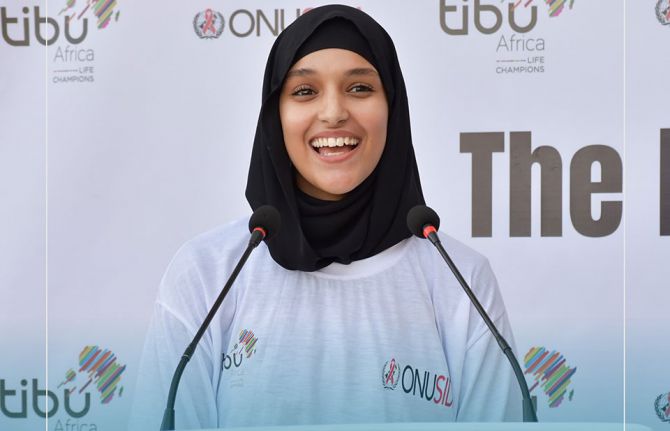
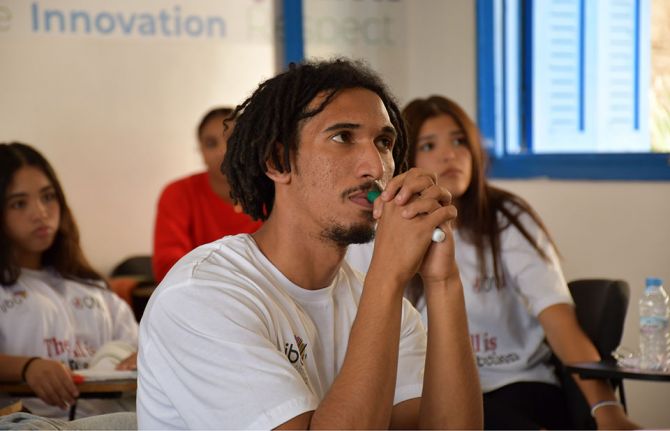
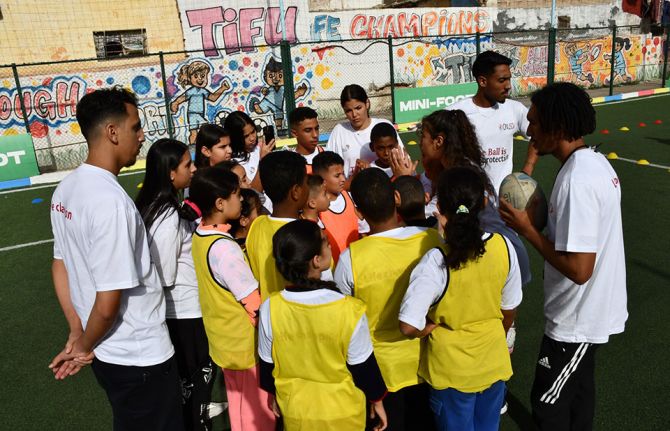
Feature Story
Driving change through sports and HIV awareness
20 December 2024
20 December 2024 20 December 2024Marouane Abouzid, a 25-year-old from Casablanca, grew up in an environment where social challenges and gender stereotypes were pervasive. However, his perspective changed the day he joined "The Ball is Your Protection" program, an initiative by Tibu Africa in partnership with UNAIDS, which uses sports to raise awareness about HIV, gender equality, and gender-based violence.
Before joining the program, Marouane had limited knowledge about HIV and gender equality. “The training on HIV awareness led by UNAIDS and Tibu Africa was a transformative experience,” he says. “It equipped me with essential skills like effective communication and active listening.” Thanks to the program, Marouane discovered how sports can be a powerful tool to engage young people on often-overlooked topics, such as HIV prevention and breaking gender stereotypes.
Now, trained to be a change ambassador in his community, Marouane leads sports activities and participates in educational sessions, becoming a role model for his peers. “I talk openly about what I’ve learned. I encourage my friends to get tested for HIV and respect the rights of others,” he shares.
For Marouane, this program was more than just training. “Today, I feel ready to take action and share what I’ve learned with my community,” he says.
During the closing ceremony of the "The Ball is Your Protection” project, Marouane facilitated workshops and sports activities with other young participants. “I saw how sports could become a tool for awareness and social mobilization,” he explains. These activities created a safe space for young people to discuss issues related to HIV and gender equality, free from societal judgment.
In Morocco, approximately 23,000 people live with HIV, nearly 50% of whom are women. Although the prevalence rate is relatively low, vulnerable groups such as sex workers, men who have sex with men, and people who inject drugs are particularly at risk. “Before, I thought HIV didn’t have a real impact on those around me. Now, I understand that we all have a role to play,” Marouane adds.
Marouane is not alone on this journey. Assia Ezzahraoui, 25, a participant in Tibu Africa’s Sports Vocational School program, reflects: “HIV awareness was a profoundly enriching experience. It gave me new insights into symptoms, prevention methods, and available treatments.” For Assia, taking part in the educational event deepened her understanding of HIV and reinforced the importance of protecting her health and that of those around her.
“I want to thank everyone who contributed to this initiative. Their commitment to young athletes in Morocco is truly inspiring,” says Assia, emphasizing the value of such events in educating youth about HIV.
Thanks to initiatives like "The Ball is Your Protection," young people like Marouane and Assia are playing an active role in addressing gender inequalities and HIV-related stigma. These young leaders are helping to build a healthier and more equitable future, proving that change can start with something as simple as a ball.
Partner
Region/country
Related
 Government ensures continuity of treatment in Malawi
Government ensures continuity of treatment in Malawi

10 February 2025

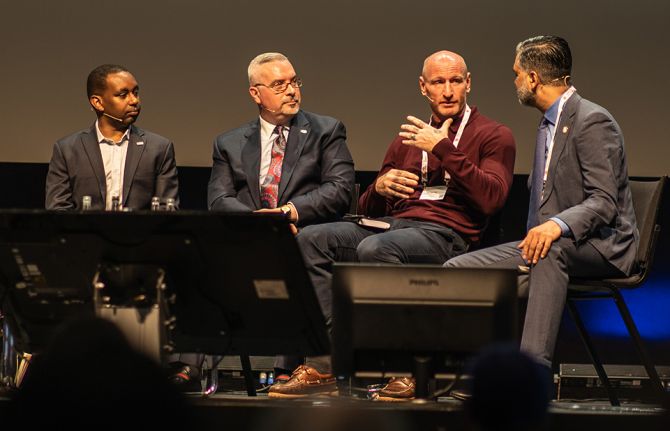
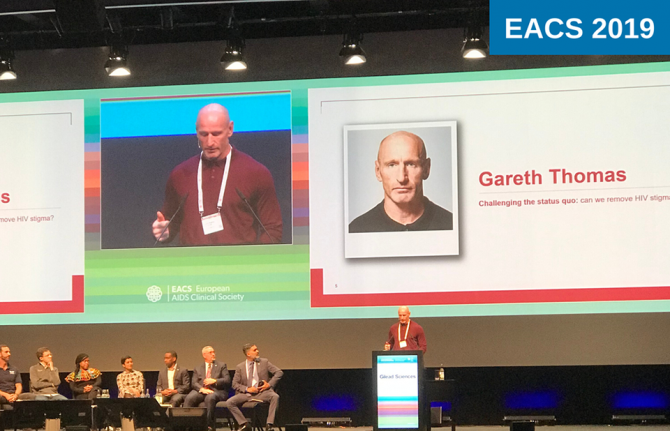
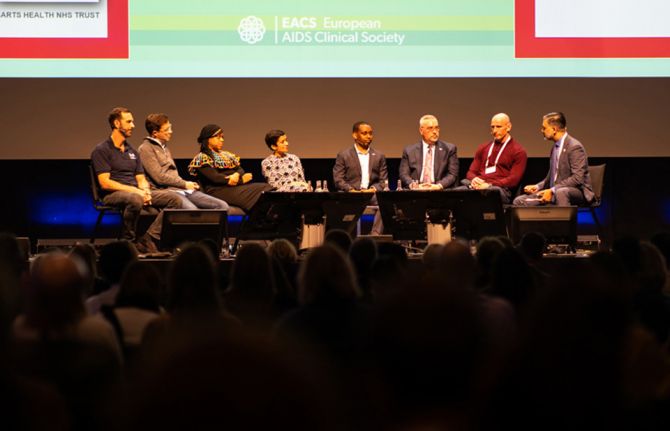
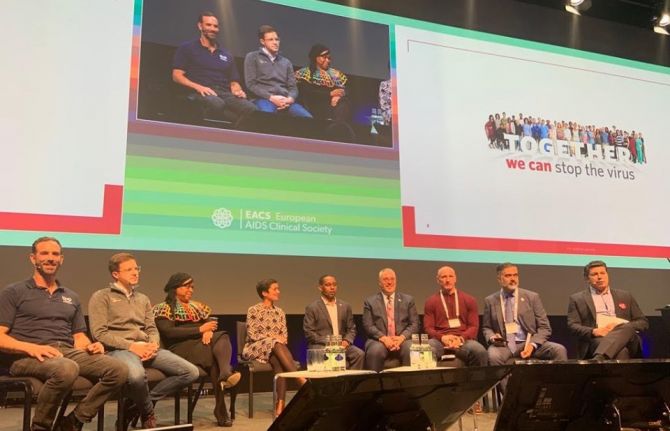
Feature Story
Former Welsh Rugby Captain Gareth Thomas speaks passionately about confronting HIV-related stigma
11 November 2019
11 November 2019 11 November 2019Welsh rugby ace Gareth Thomas has spoken out about the urgent need to confront HIV-related stigma head on. Speaking at a special event during the 17th European AIDS Conference, which was held in Basel, Switzerland, from 6 to 9 November, Mr Thomas said that he wants to help create an environment that breaks stigma and where people can make educated decisions based on facts and be free to talk openly about HIV.
It was the first time that the former Welsh rugby captain had spoken in front of an audience about his decision to publicly disclose his HIV status. He talked of the overwhelming reaction and public support following his disclosure and the airing of the BBC documentary he made about living with HIV, which included footage of him completing the International Iron Man triathlon in Wales.
He spoke of his determination to show people that living with HIV can also mean living a long, fit and healthy life and that medical advances now mean that with access to effective treatment, people living with HIV cannot transmit the virus, advances that he said not enough people know about.
“I wanted to challenge stigma head on,” said Mr Thomas. “I wanted people to see that I was capable of swimming two and a half miles in the sea, cycling 112 miles and running a marathon with HIV. If I can do that, we can do anything. Since that day, I have received nothing but support and love.”
The event was moderated by the Director of the UNAIDS Eastern Europe and Central Asia Regional Support Team, Vinay Saldanha, and shone a spotlight on the power of partnerships to advance progress towards ending AIDS. The participants included a panel of international experts working in the field of community-led organizations, funding, international partnerships and activists living with HIV.
Advocate Bruce Richman, Founder and Executive Director of the Undetectable = Untransmittable (U = U) campaign, spoke about the importance of U = U to overcome the stigma experienced by people living with and affected by HIV and how the campaign has become a public movement to break down fear and misunderstanding around HIV.
“U = U sets people living with HIV free from the fear of transmission,” said Mr Richman. “We have been living with and dying from HIV stigma for over 35 years. U = U builds our partnership to end that stigma.”
Head of the sexual health charity the NAZ Project in London, United Kingdom, Marion Wadibia spoke of how partnerships can offer culturally specific sexual health services to people being left behind. “We need to integrate race into all our work,” she said.
She was joined by other panellists who talked about the importance of using bolder business unusual approaches to end AIDS in all communities and populations. Rageshri Dhairyawan, of Barts Health NHS Trust, London, cited Soul Sisters as an example of a partnership that provides support for women who are experiencing domestic abuse for sexual health services and HIV prevention. “Violence against women and girls is a leading driver of HIV transmission,” said Mr Dhairyawan.
The event, entitled Together We Can, was organized by Gilead Sciences. The conference joined together leading HIV experts, scientists, researchers, activists and communities of people living with HIV to discuss the latest progress towards ending AIDS in Europe.
The conference gave special attention to the growing HIV epidemics in eastern Europe and central Asia, examined progress towards the 90–90–90 targets, looked at cities and municipalities that have joined the Fast Track cities partnership, discussed models of care for people living with HIV as they get older and tacked eliminating HIV-related stigma and discrimination.
Webcasts, presentations and ePosters of the 17th European AIDS Conference are available on the European AIDS Clinical Society Resource Library for a period of three months.
Related

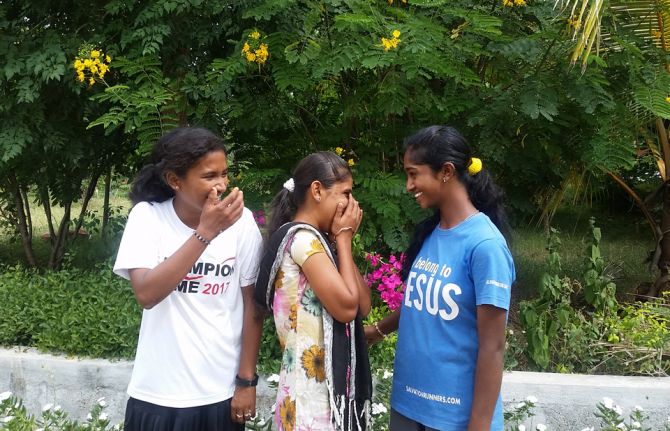
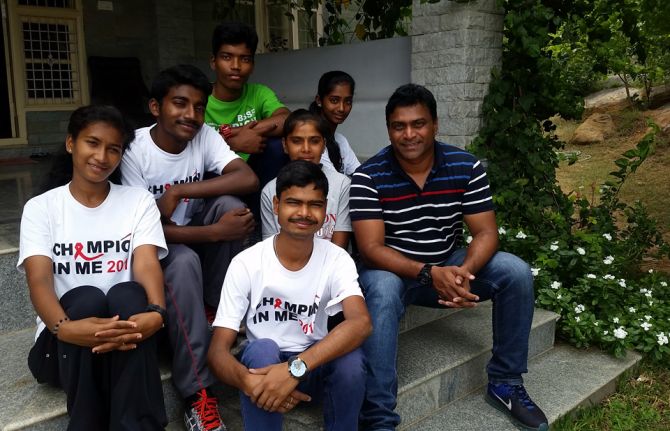
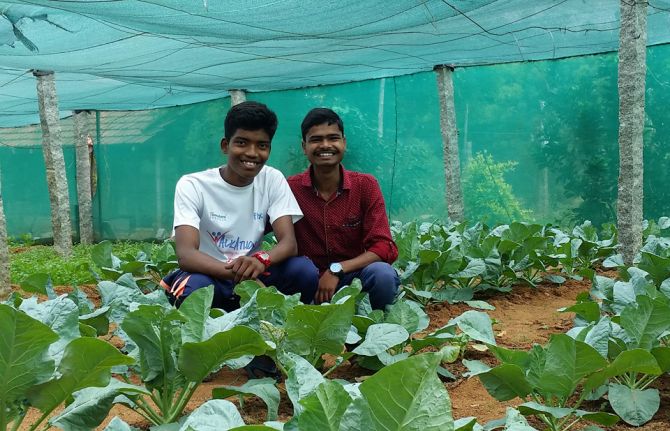
Feature Story
Running Positive: zero discrimination against adolescents living with HIV in India
24 July 2018
24 July 2018 24 July 2018As the dark monsoon clouds give way for the sun, yellowish crimson rays fall on Ambika’s face. She squints and continues to intently inspect the lush green lettuce she is growing in her backyard. The 17-year-old is living with HIV and lost both her parents to AIDS. With a glint in her eyes and a perpetual smile, she casually mentions that she likes to run in the mornings. Later, her coach proudly reveals that she is a 10-kilometre runner and is preparing to participate in the next Durban Marathon. Her friends Ashwini and Bhawani, aged 18 and 16 years, both living with HIV and 10 km runners themselves, proudly mention that, “Ambika won the Bangalore Ultra run. It was 12.5 km!”
These young women are a part of an initiative called Champion in Me that uses sport to respond to stigma and discrimination against adolescents living with HIV. Based in Bangalore, the programme uses running as a medium to empower them and strengthen their belief in themselves. Today, almost 200 children living with HIV are part of the programme, and it continues to expand. They live as a family together in the premises of Snehagram, an organization located in Tamil Nadu. Aimed at meeting the needs of adolescents living with HIV, the programme provides long- and short-term opportunities for academic learning and vocational skill development.
Manik and Babu, both 18 years old, are part of Champion in Me. They have participated in more than 20 runs, including at events such as the International Children’s Games in the Netherlands, the IDBI Marathon in New Delhi and the Boston Marathon. Their journey, challenges and experiences have been documented in Running Positive, a film screened at the International AIDS Conference, being held in in Amsterdam, Netherlands, from 23 to 27 July.
Manik said, “This film will motivate you to question the conventional image of an HIV-positive individual in India and the treatment meted out to them.” Babu explains that the film sheds light on how sports can be used to mainstream a segment of society that is vulnerable and discriminated against.
Their elated coach, Elvis Joseph, said, “I have champions who are running not just for themselves, but for all their friends who are living with HIV.”
“These young people living with HIV have inspired all of us. They have now documented their lives in this touching movie,” said Bilali Camara, UNAIDS Country Director for India.
Region/country
Related

Feature Story
UNAIDS World Cup for Ending AIDS and Discrimination kicks off in the Russian Federation
18 April 2018
18 April 2018 18 April 2018Russian and international football legends and Russian players living with HIV joined forces on 17 April to play the first football match of the UNAIDS World Cup for Ending AIDS and Discrimination. International and national football stars draw attention to the stigma faced by people living with HIV and demonstrated the value of goodwill, solidarity, and human values towards ending stigma and discrimination.
The match took place in Moscow on the eve of the opening of the Sixth Eastern Europe and Central Asia AIDS Conference. This was the first of a series of matches to be held with support from FIFA in several different countries in the lead up to the 2018 World Cup which will be held in the Russian Federation from 14 June to 15 July 2018. The initiative highlights the need for zero discrimination on the basis of race, nationality or HIV status, both on and off the pitch.
The Russian FC “Rosich” team was led by its captain, Deputy Prime Minister and Chairman of the Organizing Committee for the FIFA World Cup 2018, Arkady Dvorkovich. Team members included the Minister of Energy, Alexander Novak, the former Russian international and FIFA Anti-Discrimination Officer for the 2018 World Cup, Alexey Smertin, as well as former Russian internationals Dmitry Bulykin, Roman Shirokov, Evgeny Aldonin, Dmitry Sennikov, Oleg Kornaukhov, Marat Makhmutov, Vladimir Leonchenko and Roman Berezovsky.
Michel Sidibe, UNAIDS Executive Director, coached the UNAIDS “Red Ribbon” team, which was captained by former Cameroon international Samuel Eto’o. The Red Ribbon team featured former Senegal international, Abdoulaye Diagne-Faye, former French and Martinique international, Julien Faubert, former French under-21 international, Florent Sinama-Pongolle, former Nigerian international, Peter Odemwingie, former Moroccan international, Jaouad Zairi, Brazilian-born former Bulgarian international, Marcelo da Costa, former Palestinian women international and FIFA official, Hone Thalidjieh, and former Madagascar international, Alister Veerasamy.
Quotes
“I think the AIDS conference is a good basis for intensifying the efforts against HIV in Russia and worldwide. We are happy to contribute to the response by attracting football players, politicians and other famous people. I hope that our efforts will have an impact in preventing discrimination in any sphere.”
“Football is more than just a game. It is a vehicle for connecting people and building a bold social movement for change. It is an honour to launch the UNAIDS World Cup for ending AIDS and Discrimination campaign together with partners from the Russian Government, the FIFA World Cup 2018 and international football stars here in Moscow.”
“We perceive football as much more than simply a game of 90 minutes of play. It also brings very important feelings of respect, fraternity and togetherness into our lives. The simple fact that Russian and international players together with Russian HIV positive players have chosen to play in this match clearly shows that we stand united in working towards achieving zero discrimination regardless of race, colour, faith, gender or HIV-status. We will do everything we can to make that all the players and fans coming to Russia for the FIFA World Cup 2018 feel welcome, at ease and at home.”
“I am very happy to be back to this wonderful country, to this amazing city. It is an honour for me to be engaged in this noble work of ending AIDS and against discrimination.”
Region/country
Related
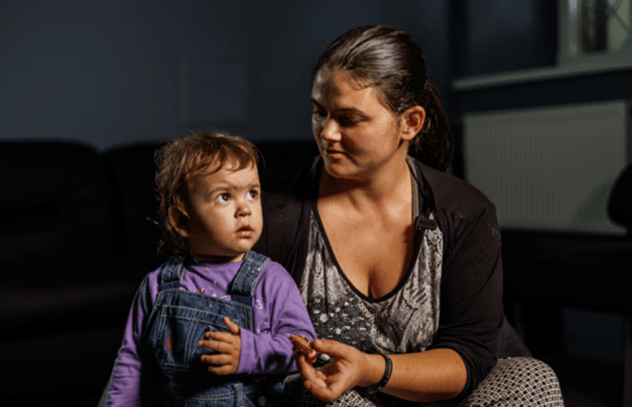 Three Years On: From crisis to prospective recovery
Three Years On: From crisis to prospective recovery

20 February 2025

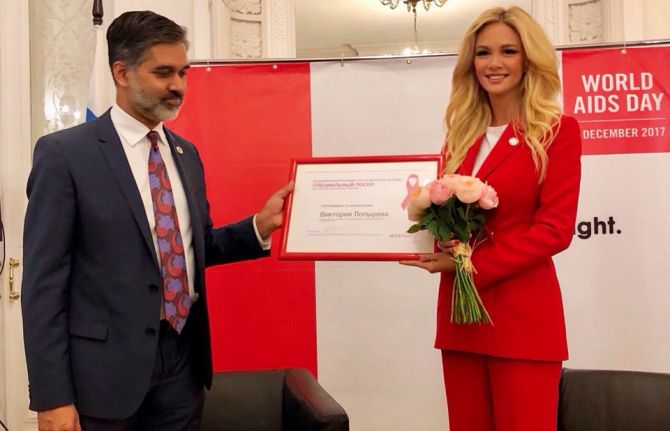
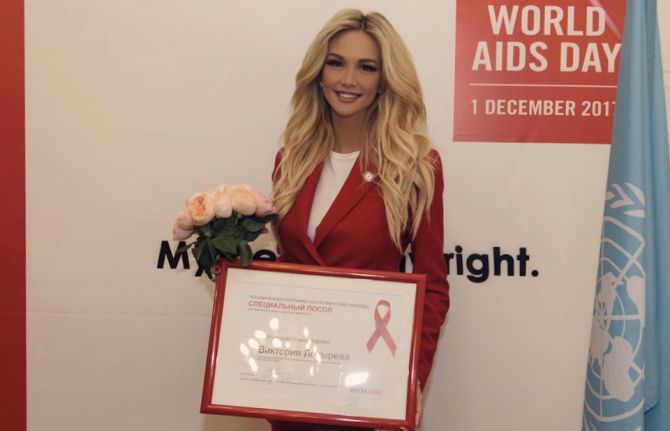
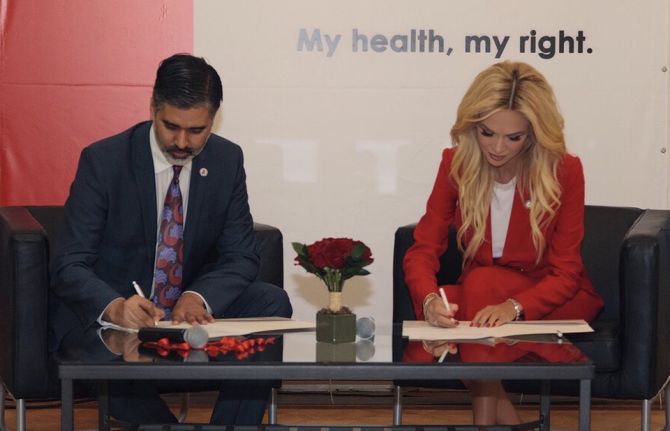
Feature Story
Victoria Lopyreva appointed as a UNAIDS Special Ambassador for the 2018 FIFA World Cup
30 November 2017
30 November 2017 30 November 2017Victoria Lopyreva has been appointed as a UNAIDS Special Ambassador, tasked with highlighting HIV awareness and promoting zero discrimination during the 2018 FIFA World Cup, which will be held in the Russian Federation. The announcement was made by UNAIDS in Moscow, Russian Federation, on the eve of World AIDS Day and the final draw for the 2018 FIFA World Cup at the State Kremlin Palace.
“In her new capacity as a UNAIDS Special Ambassador, Victoria Lopyreva will highlight HIV awareness and prevention during the 2018 FIFA World Cup. She will encourage millions of people coming to the World Cup to protect themselves from HIV and champion zero discrimination on the basis of race, nationality or HIV status,” said Vinay P. Saldanha, Director for the UNAIDS Regional Support Team for Eastern Europe and Central Asia.
“It is my pleasure to accept the role as UNAIDS Special Ambassador for the 2018 FIFA World Cup,” said Ms Lopyreva. “Football is a unique global phenomenon, uniting players, teams and fans from different countries, nationalities and ages. The 2018 FIFA World Cup is a unique opportunity to promote another amazing goal—to unite a winning team to end the AIDS epidemic and reach zero discrimination.”
"I appreciate and value every day Victoria Lopyreva's commitment as FIFA World Cup 2018 Ambassador in Russia. Her passion, her dedication and her energy will definitely help raise awareness on HIV and AIDS in and outside Russia. Victoria's contribution to fighting all forms of discrimination in and off the pitch is something that FIFA can be proud of and I wish her full success in her additional role as UNAIDS Special Ambassador in Russia,” said Fatma Samoura, FIFA Secretary General.
Since the beginning of the AIDS epidemic, 78 million people have become infected with HIV and 35 million have died from AIDS-related illnesses. In 2016, around 1.8 million people were newly infected with HIV, a 39% decrease from the 3 million who became newly infected at the peak of the epidemic in the late 1990s. In eastern Europe and central Asia, new HIV infections have risen by 60% since 2010 and AIDS-related deaths by 27%. According to government data, more than 900 000 people are currently living with HIV in the Russian Federation.
Ms Lopyreva was crowned Miss Russia in 2003 and since October 2015 has been an official Ambassador of the 2018 FIFA World Cup. Ms Lopyreva also served as an Ambassador for the XIX World Festival of Youth and Students 2017, held in Sochi, Russian Federation, and works as a television presenter, event host, motivational speaker and model.
Region/country
Related
 Three Years On: From crisis to prospective recovery
Three Years On: From crisis to prospective recovery

20 February 2025

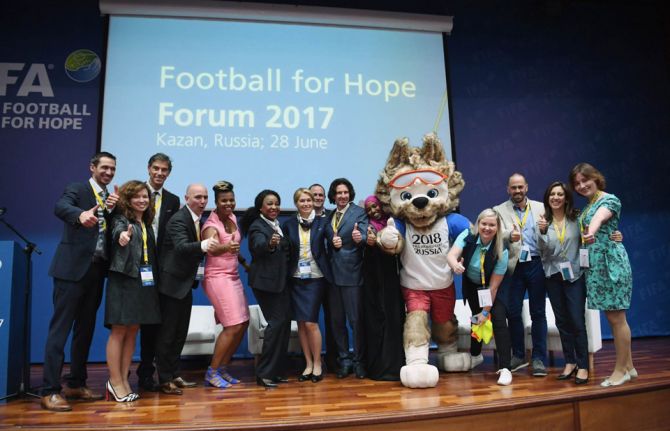
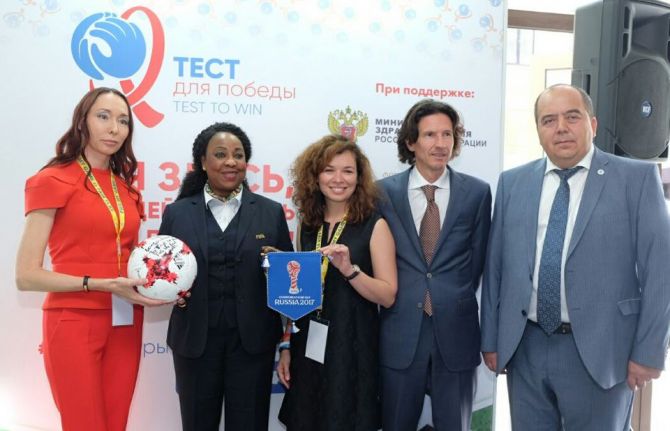
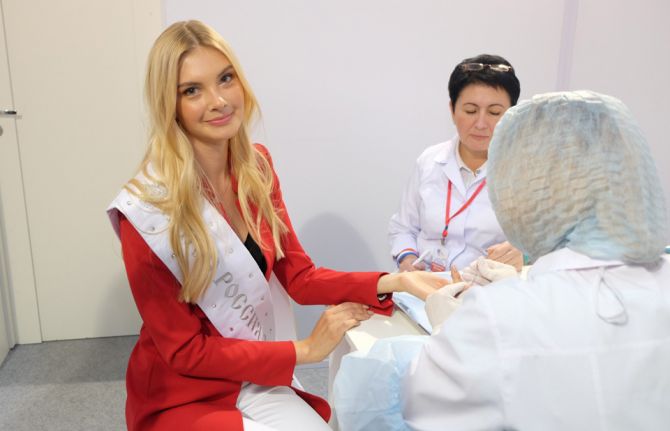
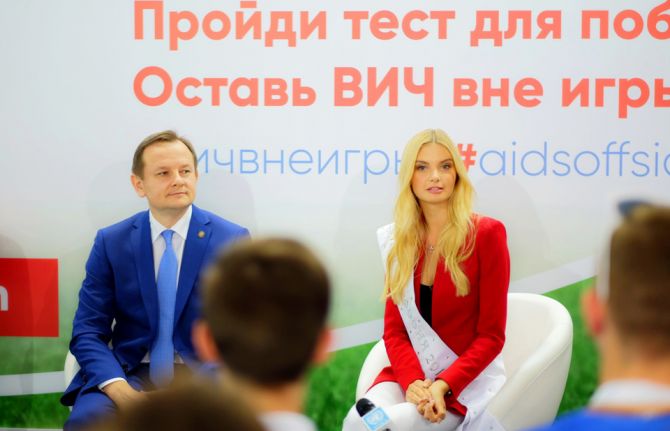
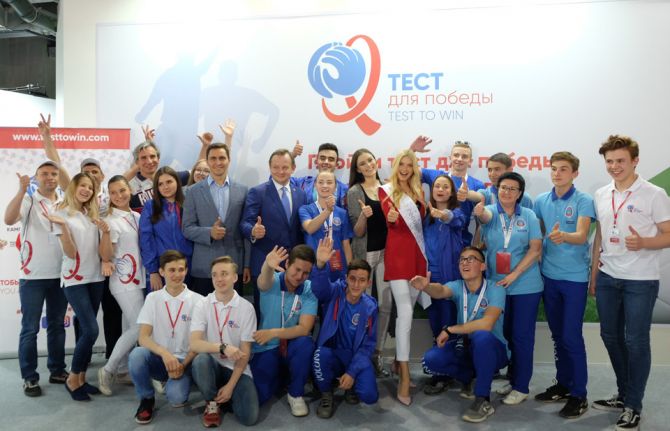
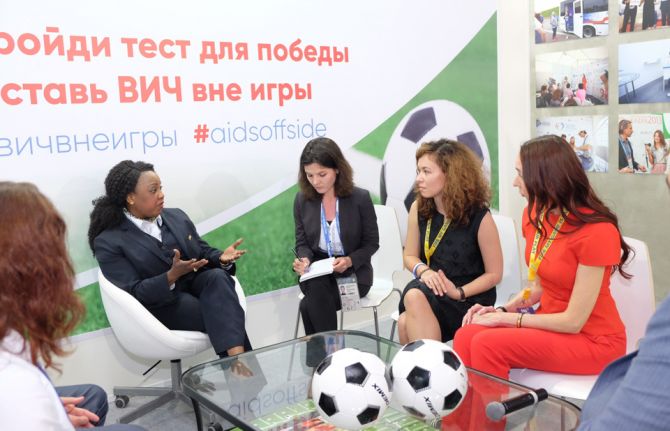
Update
Test to Win at the 2017 FIFA Confederations Cup
06 July 2017
06 July 2017 06 July 2017Free and anonymous HIV testing and counselling were available from the Test to Win pavilion in Kazan, Russian Federation, during the Fédération Internationale de Football Association (FIFA) Confederations Cup, held between 17 June and 2 July.
The pavilion also included an exhibition on HIV and sports and was the scene for workshops, training and appearances by sports celebrities, during which visitors could learn more about HIV. Fatma Samoura, the FIFA General Secretary, visited the pavilion, as did 2018 FIFA World Cup Ambassador Alexey Smertin, Miss Russia 2017, Polina Popova, and the photographer Serge Golovach.
During the two weeks of the competition, more than 3500 people visited the pavilion and received counselling on health issues—more than 1000 of whom were tested for HIV.
The campaign was led by the nongovernmental organization New Century, in partnership with Svetlana Medvedeva’s Foundation for Social and Cultural Initiatives and with support from the Ministry of Health of the Russian Federation, the Republican Center for Prevention and Control of AIDS, the Ministry of Health of Tatarstan and UNAIDS.
On 26 and 28 June, Kazan hosted FIFA’s Forum 'Football for Hope' to promote and develop the use of football as a tool for social development in the Russian Federation and abroad. The forum brought together representatives of nongovernmental organization supported by FIFA’s Football for Hope from all over the globe to share their experiences and successes working in social development in football. The programme included panel discussions with the participation of UNAIDS and others on how football can help to achieve the Sustainable Development Goals.
Quotes
“UNAIDS’ Protect the Goal campaign at previous World Cups used sport to empower young people and adults to access HIV services. I hope that Test to Win will also become a flagship campaign initiative to mobilize people in the Russian Federation and globally.”
“This is not the first project on HIV and sports in Tatarstan and we are happy to continue our collaboration not only in sports with FIFA, but in innovative social development such as HIV prevention and the Test to Win campaign.”
“The most important thing is to involve and convince as many young people as possible. That in no case should you be ashamed to learn more about HIV and get tested. Everyone needs to know their HIV status!”
“FIFA’s Football for Hope demonstrated the global power of football to achieve gender equality, provide access to education, build piece and end AIDS. The Test to Win campaign is another example on how sport can help to reach the 90–90–90 targets.”
Region/country
Related
 Three Years On: From crisis to prospective recovery
Three Years On: From crisis to prospective recovery

20 February 2025

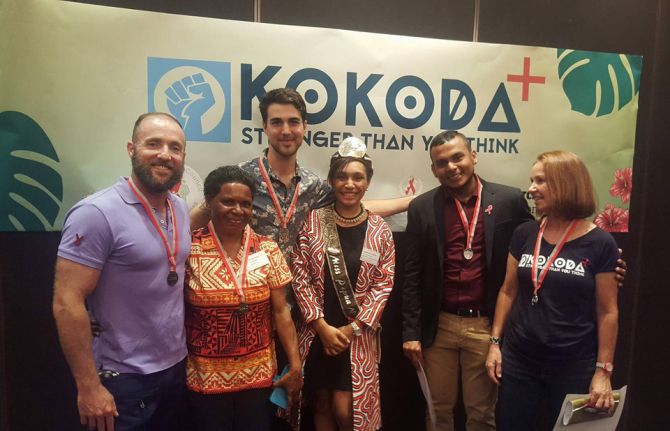
Update
Braving the Kokoda trail to raise HIV awareness in Papua New Guinea
03 July 2017
03 July 2017 03 July 2017The Kokoda trail winds through the Owen Stanley Range in Papua New Guinea and is billed as one of the world’s most challenging treks. Nearly 100 km long, the track goes through rugged mountainous terrain and hikers are buffeted by hot and humid days followed by intensely cold nights. Carol Habin is a member of the national organization of people living with HIV in Papua New Guinea, called Igat Hope Inc., and she decided to raise HIV awareness by hiking the trail in June. She joined a group of around 20 people from Australia, which also included HIV-positive people.
“As a woman who works in HIV advocacy programmes, I have come to realize that women are vastly underrepresented in my country,” said Ms Habin. “Violence against women in Papua New Guinea is extremely high. I wanted to walk the trek to not only raise awareness about HIV stigma and discrimination, but also to empower women living with HIV and to make sure their voices are heard.”
The initiative Ms Habin joined was led by the HIV Foundation of Queensland under the Kokoda+Stronger Than You Think project. UNAIDS supported the mobilization of resources for Ms Habin’s participation in the trek. The team was led by Ji Wallace, who is an Australian living with HIV and an Olympic athlete.
“With a lot of work, we can change the attitude of the community,” said Mr Wallace. “It may not happen overnight, but we have the power within us to change.”
The trekkers took eight days to complete the hike. They conducted HIV awareness sessions with people living in villages along the track.
“I was surprised to find out how little the villagers knew about HIV,” said Ms Habin. “This initiative was very helpful in getting them to understand people living with HIV. I think also thanks to media coverage we have helped transform the way the public views HIV-positive people. I’ve shown everyone that as a woman living with HIV I can do anything, even hike one of the world’s toughest trails.”
Papua New Guinea has the largest HIV epidemic in the Pacific Islands. In 2015, there were 40 000 people living with HIV in the country and 2700 new HIV infections. The country is one of the few in the Asia and the Pacific region in which women are at higher risk of HIV than men, with 56% of new HIV infections occurring among women.
“I particularly want young women to understand they can say no to sex and stand up for their rights,” said Ms Habin.
The hikers completed the hike in late June and returned to Port Moresby for a celebration. UNAIDS Papua New Guinea Country Director David Bridger congratulated the team.
“Papua New Guinea has made immense progress in its HIV response,” said Mr Bridger. “But until the fear that generates misconceptions and breeds stigma is overcome, the AIDS epidemic will continue to claim lives. The Kokoda+Stronger Than You Think initiative is an innovative way to help break down misconceptions and celebrate the strength of people living with HIV. I congratulate your efforts.”
Ms Habin plans to build on the initiative and work with the Government of Papua New Guinea to encourage more people to take HIV tests and adapt HIV prevention to the needs of young women.
Region/country
Related

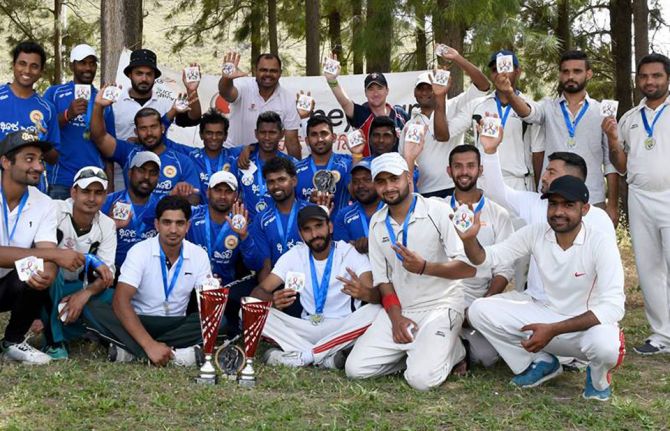
Update
Bowling out AIDS in Cyprus
19 June 2017
19 June 2017 19 June 2017In the finale to the Cyprus 2017 cricket spring season, in May, the Cyprus Cricket Association, in partnership with Cricket without Boundaries and UNAIDS, held a series of events to raise awareness about HIV in Cyprus.
Two hundred schoolchildren from six schools took part in a festival of cricket, at which they played in knock-out competitions and learned about AIDS. Lee Booth, from Cricket without Boundaries, a British nongovernment organization that uses cricket to deliver health and social messages, engaged the children and raised awareness about how they can protect themselves against HIV.
Budding coaches and young people from the local cricket academy also learned about HIV in special events as part of the campaign, which drew upon the World AIDS Day theme, “Hands up for #HIVprevention”.
The final day of events was targeted at adult cricketers, as members of the two finalist teams of the Cyprus Cricket Association #MoneyGram Spring T20 competition learned about HIV prevention and how to stand together against HIV-related discrimination.
In all the events, information on HIV prevention and testing supplied by UNAIDS was made available.
Cricket has a longstanding role in the response to HIV, with THINK WISE, a partnership between the International Cricket Council, UNAIDS and the United Nations Children’s Fund, using the spirit of cricket to support global efforts to end the AIDS epidemic at the Cricket World Cup and beyond.
Quotes
“We are thankful to UNAIDS, Cricket without Boundaries and our long-time sponsors #MoneyGram for supporting the activities. We are pleased that we made it possible for the Cypriot people to gain access to genuine information in the response to HIV.”
“Cricket Without Boundaries is delighted to be working with the Cyprus Cricket Association and UNAIDS to develop cricket in Cyprus and help join the response against HIV in the country. We hope the project will help tackle the stigma surrounding HIV, promote methods to prevent the spread of HIV and raise awareness of the importance of testing and, where relevant, accessing treatment.”
“Cricket is one of the most popular sports in the world and has a real power to inspire young people and share knowledge about HIV. The support of the cricketing world demonstrates how ending the AIDS epidemic is a common goal for people from all walks of life.”
Region/country
Related
 Government ensures continuity of treatment in Malawi
Government ensures continuity of treatment in Malawi

10 February 2025


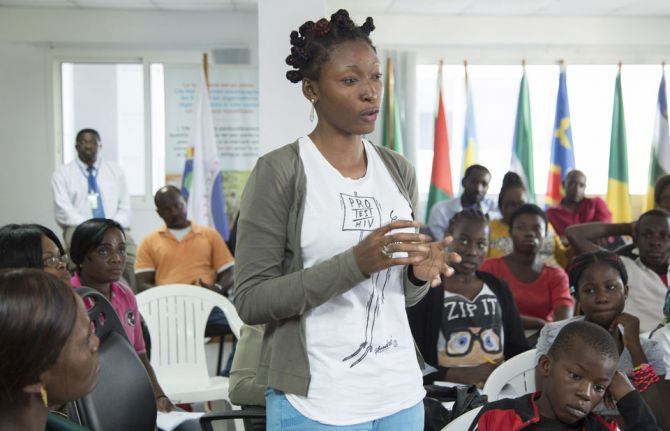
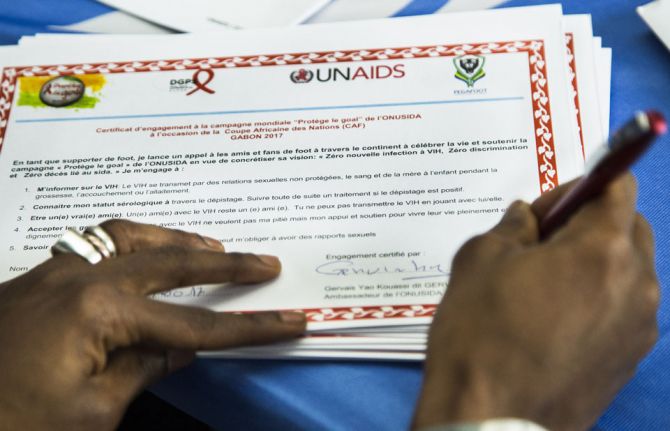
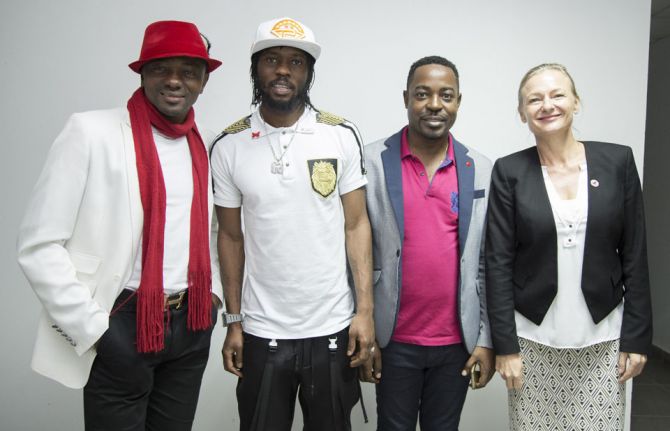
Feature Story
Gervinho meets young people affected by HIV in Gabon ahead of CAN 2017
19 January 2017
19 January 2017 19 January 2017Travelling to Gabon to attend the Africa Cup of Nations (CAN 2017), Gervais Yao Kouassi (Gervinho), UNAIDS Special Ambassador for Youth and China–Africa Collaboration, visited the UNAIDS office in Libreville, Gabon, to meet some 50 children and young people living with or affected by HIV.
Accompanied by young Gabonese ambassadors for HIV and by artist Charly Tchatch, the animator of the opening of CAN 2017 and an AIDS activist, the international football star talked to the children and young people and listened to their stories and concerns. The children and young people talked about problems with accepting their status and stigma and depression, but also about happiness, love and how they deal with their daily problems.
“I am very touched. It is the first time I hear such poignant testimonies”, said Gervinho. “As you know, I wanted to play with my team here, but I am injured. Your mental strength and joy of life encourages me to face life’s challenges.” Gervinho signed the Protect the Goal campaign ball to support UNAIDS’ vision of zero new HIV infections, zero discrimination and zero AIDS-related deaths at CAN 2017.
Inge Tack, the UNAIDS Country Director, mentioned to Gervinho that despite AIDS budget cuts of 60% in Gabon since 2012, treatment rates have doubled and new HIV infections have been reduced by 30%, while paediatric treatment rates have tripled and coverage of prevention of mother-to-child transmission is at 78%. However, she also noted the need to improve the management of HIV treatment provision to achieve the 90–90–90 targets. “A radical shift in the organization and management of treatment delivery services is required to achieve the 90–90–90 targets in Gabon. Medicines need to be in the centre at all times and services reoriented to better serve patients’ needs,” said Ms Tack.
Gabon experiences persistent treatment stock-outs and poor care services result in no treatment adherence follow-up, no monitoring of drug resistance and no viral load measurement. Ms Tack stressed the need for a decentralized approach for the provision of antiretroviral therapy and an increase in community-led services.
Region/country
Related
 Impact of the pause of US foreign assistance in Côte d'Ivoire
Impact of the pause of US foreign assistance in Côte d'Ivoire

19 February 2025




